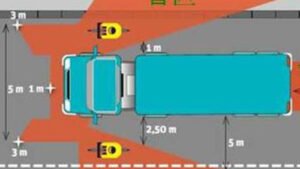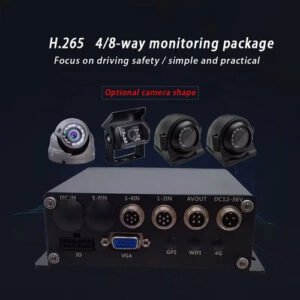Forklifts play a critical role in industrial operations, particularly in warehouses, manufacturing facilities, and logistics hubs. However, their operation comes with challenges, including limited visibility, safety risks, and potential inefficiencies. Industry forklift cameras address these challenges by providing operators with real-time video feeds and advanced analytics. This article explores the features, benefits, applications, and future trends of forklift cameras, highlighting their impact on industrial safety and productivity.
What is an Industry Forklift Camera?
An industry forklift camera is a video recording and monitoring device installed on forklifts to enhance operator visibility, safety, and efficiency. These cameras provide real-time feeds of blind spots, fork positioning, and the surrounding environment. Integrated with modern technologies such as AI and cloud connectivity, forklift cameras are essential tools for improving material handling and minimizing operational risks.
Key Features of Industry Forklift Cameras
Forklift cameras are equipped with various advanced features to support industrial operations:
- High-Definition Video: Provides clear and detailed visuals of the surrounding environment and load positioning.
- Wide-Angle Lenses: Offers a broader field of view, reducing blind spots and enhancing operator awareness.
- Fork Tip Cameras: Positioned on the forks to assist operators in precise load handling and placement.
- Wireless Connectivity: Enables real-time video transmission to monitors in the operator’s cabin or remote devices.
- Night Vision: Infrared LEDs ensure visibility in low-light or nighttime conditions.
- Durable Design: Cameras are built to withstand harsh industrial environments, including impacts, dust, and extreme temperatures.
- Split-Screen Display: Displays multiple camera angles simultaneously for comprehensive situational awareness.
- AI-Powered Alerts: Detects obstacles, pedestrian movement, or unsafe operations, providing immediate warnings.
- Cloud Storage: Stores video data securely for later analysis and training purposes.
How Industry Forklift Cameras Work
Forklift cameras function as part of an integrated safety and monitoring system, combining hardware and software for enhanced operation:
- Video Capture: Cameras record high-definition video of blind spots, fork movement, and the surrounding area.
- Data Transmission: Video feeds are transmitted to in-cabin monitors or remote devices via wired or wireless connections.
- Real-Time Display: Operators view live video feeds, improving their situational awareness and precision.
- AI Analytics: Advanced systems analyze video data to detect potential hazards or unsafe behaviors.
- Storage and Retrieval: Footage is stored locally or in the cloud for future analysis or compliance purposes.
Benefits of Industry Forklift Cameras
1. Enhanced Operator Visibility
Forklift cameras eliminate blind spots and provide operators with a clear view of their surroundings, reducing the risk of accidents.
2. Improved Safety
Real-time video feeds and AI-powered alerts help prevent collisions, falls, and other workplace accidents, ensuring a safer environment.
3. Increased Efficiency
Cameras assist operators in precise load handling and placement, improving productivity and reducing operational delays.
4. Cost Savings
By preventing accidents and minimizing damage to goods and equipment, forklift cameras help reduce repair and insurance costs.
5. Better Training and Accountability
Recorded footage can be used to train new operators, evaluate performance, and foster a culture of accountability.
6. Enhanced Fleet Management
Fleet managers can use camera data to monitor forklift usage, optimize workflows, and ensure compliance with safety standards.
Applications of Industry Forklift Cameras
Forklift cameras are utilized in various industrial settings to enhance safety, efficiency, and accountability:
1. Warehousing
Cameras assist operators in navigating tight spaces, stacking pallets accurately, and avoiding collisions in busy warehouses.
2. Manufacturing
In manufacturing facilities, forklift cameras improve efficiency in moving raw materials, components, and finished goods.
3. Logistics and Distribution
Logistics hubs rely on cameras to streamline the loading and unloading of goods, ensuring timely and accurate deliveries.
4. Construction
Forklift cameras enhance safety and precision in handling heavy loads on construction sites, reducing risks and improving workflow.
5. Ports and Terminals
Cameras play a crucial role in handling large containers and cargo in ports, improving efficiency and preventing accidents.
Future Trends in Industry Forklift Cameras
The development of forklift cameras is driven by advancements in technology and the growing emphasis on workplace safety:
1. Integration with IoT
Forklift cameras will integrate with IoT platforms, providing real-time data for smarter fleet management and predictive maintenance.
2. AI-Powered Analytics
Advanced AI algorithms will enable cameras to predict potential hazards, offering proactive safety measures.
3. 5G Connectivity
The adoption of 5G networks will support faster video transmission, enhancing real-time monitoring capabilities.
4. Autonomous Forklifts
Cameras will play a critical role in enabling autonomous forklifts and providing navigation and obstacle detection capabilities.
5. Enhanced Video Quality
Cameras will offer ultra-high-definition resolution, providing operators with even clearer visuals for precise operations.
6. Sustainability
Energy-efficient and solar-powered camera systems will support eco-friendly operations in industrial facilities.
Challenges and Solutions
Despite their benefits, forklift cameras face certain challenges:
1. High Initial Costs
Advanced camera systems can be expensive, but their long-term benefits in safety and efficiency often outweigh the investment.
2. Maintenance Requirements
Regular maintenance is essential to ensure optimal performance, particularly in harsh industrial environments.
3. Operator Training
Training operators to use camera systems effectively is critical for maximizing their benefits.
Conclusion
Industry forklift cameras are revolutionizing material handling and warehouse safety by providing enhanced visibility, real-time monitoring, and advanced analytics. From warehouses to construction sites, these cameras improve efficiency, reduce risks, and foster a safer working environment. As technology continues to evolve, forklift cameras will become even more integral to industrial operations, offering AI-powered analytics, IoT integration, and seamless connectivity. Explore the latest forklift camera systems to unlock their potential for your business.






